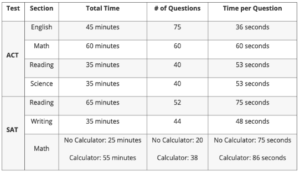
SAT vs. ACT: Which Test Should My Student Take?
SAT vs. ACT: Facts to Know When Deciding Which Test to Take
Both the SAT and ACT are college entrance exams that are used by college admissions committees to determine successful student applications. There is often a lot of confusion and anxiety for parents and students when deciding which test is the right one to take. It is a common misconception that colleges and universities favor SAT scores over ACT scores. This is largely because the SAT was the predominant test accepted by most colleges for a long time—but that time has long passed. In fact, schools now accept either one, and college admissions counselors openly state that they do not favor one over the other. So which one should you take?
Although there are many differences between the SAT and ACT, there are a few crucial differences to consider before determining which test will be the better option. Depending on your child’s academic strengths, they may be able to use these differences to their advantage. Ponder the following questions:
- How many math subjects does your child have a strong grasp of?
The ACT and SAT both emphasize algebra. However, the ACT also incorporates graphs of trigonometric functions, matrices, and logarithms—topics not covered on the SAT. Overall, the ACT math sections consist of roughly a quarter to a third geometry and trigonometry questions, while the SAT focuses about 10% in these subjects and mostly consists of algebraic questions. Another factor to consider in the math section is that the ACT will not give students any mathematical formulas, whereas the SAT will give most of the formulas necessary to solve problems at the beginning of the section. It is important to think about whether your child is strong in Algebra vs. Geometry and Trigonometry, and also if they are strong in memorizing formulas.
- Does your child work better with or without a calculator?
While the ACT allows students to use a calculator for all math sections, the SAT has one math section where a calculator is not allowed (and one in which a calculator is allowed). Students who are not confident in doing calculations by hand might find the no calculator math section on the SAT to be challenging.
- How robust is your child’s science vocabulary and how well can she/he interpret charts/tables/graphs?
The ACT includes an entire section dedicated to science. While the SAT does weave in some of these concepts throughout, students will have to answer more science questions on the ACT. However, the science section doesn’t test science skills in a conventional sense. In other words, it doesn’t require students to know a lot of scientific facts. However, it does use a lot of scientific terminology, and presents a variety of charts and graphs for analysis. Therefore, students with a strong science background, broad knowledge of scientific terminology, and experience with interpreting data from charts and graphs will have an advantage on the ACT.
- How well can your child remember and reference details in a passage? And how quickly can they cite evidence for their answers?
One important thing to note about the SAT reading section is that it gives the line number within the passage where the information in question can be found—the ACT does not. SAT passages also give more information overall compared to ACT passages. The SAT also has two-part questions that involve providing evidence or support for answers—the ACT does not. Therefore, if your child can locate information in a passage easily and is strong in locating evidence/support for answers, the ACT may be the advantageous test (and vice-versa).
- Is your child more confident with writing style or grammar and punctuation?
The SAT generally focuses on passages that encourage writing style and vocabulary, while the ACT is more invested in grammar, punctuation, and sentence structure. The ACT also asks about the main idea of the passage, whereas the SAT does not. Students with solid grammar skills may find the ACT to be easier, while those with strong stylistic and vocabulary skills may prefer the SAT.
- How well does your child do under time constraints?
The ACT allows much less time per question compared to the SAT. Here is the breakdown:

Sourced from: blog.prepscholar.com
The factors covered in this article are a general guide to the things that should be considered prior to deciding which test would be best suited to your child. The best way to really gauge which test is advantageous for your child is to have him/her take both a full-length SAT practice test and a full-length ACT practice test. Compare the two scores to national averages, and then to each other to find out how well she/he did on both tests.
